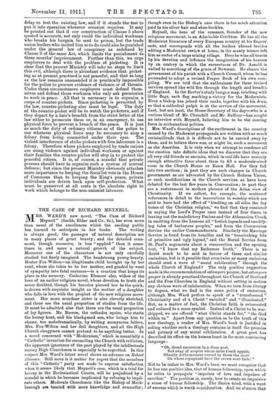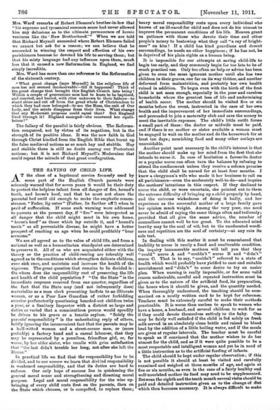THE CASE OF RICHARD ME YNELL.
MRS. WARD'S new novel, " The Case of Richard Meynell" (Smith, Elder and Co., 6a.), has even more than usual of the excellences which the reading public has learned to anticipate in her books. The writing is always good; the passages of natural description are in many places of great beauty; and the detailed orna- ment, though excessive, is less " applied " than it some- times is, and more a natural growth of the subject. Moreover one of the characters is not only carefully studied but finely imagined. The headstrong young beauty, Hester Fox-Wilton--an illegitimate child brought up by her aunt, whom she takes to be her mother, and goaded by want of sympathy into fatal rashness—is a creation that keeps its place in the memory. Catherine Elsmere also, widow of the hero of an earlier religious novel, whose devotion to truth she never doubted, though his heresies pierced her to the quick, is drawn with exquisite insight as the mother of a daughter who falls in love with the prophet of the new religious move- ment. Her more mundane sister is also cleverly sketched, and there are the usual proportion of studies from the life. It must be admitted also that there are the usual proportion of lay figures. Mr. Barron, the orthodox squire, who starts the heresy hunt, and his blackguard son, who brings him to shame, too melodramatically, by writing anonymous letters, Mrs. Fox-Wilton and her dull daughters, and all the High Church clergymen cannot pretend to be anything better. In a novel concerned with " Modernism," which is essentially a "Catholic" invention for reconciling the Church with criticism, the apparent ignorance of the part played by the intellectuals among High Churchmen is especially to be regretted. In this respect Mrs. Ward's latest novel shows no advance on Robert Elemere. Still more is it matter for regret that the members of this " Catholic" party are made to express satisfaction when it seems likely that Meynell's case, which is a trial for heresy in the Ecclesiastical Courts, will be prejudiced by a scandal in which he becomes implicated by refusing to impli- cate others. Moderate Churchmen like the Bishop of Mark- borough are treated with more knowledge and sympathy;
though even in the Bishop's case there is too much attention paid to his silver hair and shoe-buckles.
Meynell, the hero of the romance, founder of the new religious movement, is an Admirable Crichton. He has all the Modernist literature of every European country at his fingers' ends, and corresponds with all the leaders abroad besides editing a Modernist review at home, in the scanty leisure left him as rector of a large mining village. Here he wins all hearts by his devotion and inflames the imagination of his hearers by an oratory in which the earnestness of Dr. Arnold is united to something of the grace of Newman. He shares the government of his parish with a Church Council, whom he has persuaded to adopt a revised Prayer Book of his own com.
piling. We are told that the enthusiasm for these revised services spread like wild fire through the length and breadth of England. In the Rector's study hangs a map, bristling with little flags, each flag marking a victory for the Modernists. Even a bishop has joined their ranks, together with his dean, so that a cathedral pulpit is at the service of the movement.
Last, but not least, the Home Secretary of the day—who is a curious blend of Mr. Churchill and Mr. Balfour—has sought an interview with Meynell, believing him to be the coming force in ecclesiastical politics.
Mrs. Ward's descriptions of the excitement in the country caused by the Modernist propaganda are written with so much verisimilitude that it is difficult not to be carried away by them, and to believe there was, or might be, such a movement as she' describes. It is only when we attempt to condense all the emotion into definite ideas that we discover that they are all very old friends or enemies, which in real life have scarcely enough attractive force about them to fill a moderate-sized room in the Church House or Essex Hall. For they fall into two sections ; in part they are such changes in Church government as are advocated by the Church Reform Union, or such modifications in the Church services as have been debated for the last few years in Convocation; in part they are a restatement in modem phrases of the Arian view of Christianity. If we collect, for example, the scattered references in detail to the innovations in worship which are said to have had the effect of "kindling on all sides the dry bones of the Christian religion," we find that they consisted in saying the Lord's Prayer once instead of four times, in leaving out the maledictory Psalms and the Athanasian Creed, in omitting from the Lessons all " foolish legends and unedify. ing tales of barbarous peoples," and from the Communion Service the earlier Commandments. Similarly the Marriage Service is freed from its homilies and its "besmirching bits of primitive and ugly legend," and the Burial Service from St. Paul's arguments about a resurrection and the opening text, " I know that my Redeemer liveth." There is no doubt much to be said in favour of these and similar omissions, but is it possible that even twice as many omissions should send a wave of "moral exhilaration" through the whole Church of England P The only positive suggestion
made is the recommendation of extempore prayer; but extempore
prayer is already practised throughout the Church of Scotland and the Free Churches in England without setting in motion any obvious wave of exhilaration. When we turn from liturgy to dogma, what we find is the same policy of omissions, although Mrs. Ward prefers to speak of a " transformed " Christianity and of a Christ " unveiled" and " illuminated."
But, as a matter of fact, the Christian faith is eviscerated and reduced to a mere symbol. Instead of a Christ to be wor- shipped, we are offered "what Christ stands for," "the God within us." Apart from any question as to the truth of this new theology, a reader of Mrs. Ward's book is justified in asking whether such a theology contains in itself the promise and potency of any moral exhilaration. A great poet has described its effect on the human heart in far more convincing language :
" Oh, dread succession to a dizzy post,
Sad sway of sceptre whose mere touch appals,
Ghastly dethronement cursed by those the most On whose repugnant brow the crown next falls l "
Not to be unfair to Mrs. Ward's hero, we must recognize that he has one positive idea, that of human fellowship, upon which he relies to propagate "impulses of love and impulses of sacrifice." The problem is, surely, how to create so impulsive a sense of human fellowship. The Stoics tried, with a want
of success which is worth consideration. And we observe that
Mrs. Ward remark■ of Robert Elsmere'e brother-in-law that " his supreme and tyrannical common sense had never allowed him any delusions as to the ultimate permanence of heroic ventures like the ' New Brotherhood.'" When we are told that Richard Meynell succeeded where Robert Elsmere failed we cannot but ask for & reason; we can believe that be succeeded in winning the respect and affection of his own parishioners because he devoted his life to serving them; but that his misty language had any influence upon them, much less that it caused a new Reformation in England, we find simply incredible.
Mrs. Ward has more than one reference to the Reformation of the sixteenth century.
"What great change [says Meynell] in the religious life of men has not seemed inconceivable—till it happened! Think of the great change that brought this English Church into being I Within a couple of generations men had to learn to be baptized, and married, and buried, with rites unknown to their fathers—to stand alone and cut off from the great whole of Christendom to which they bad once belonged—to see the Mass, the cult of Our Lady, and the saints disappear from their lives. What change that any Modernist proposes could equal that? But England lived through it! England emerged—she recovered her equili- brium!"
The fallacy of the parallel is fairly obvious. The Reforma- tion conquered, not by virtue of its negations, but in the
strength of its positive ideas. It was the new faith in God through Christ kindled from the English Bible that burnt up the false medimval notions as so much hay and stubble. Hay and stubble there is still no doubt among our Protestant notions; but it is not Richard Meynell's Modernism that could repeat the miracle of that great conflagration.



















































 Previous page
Previous page